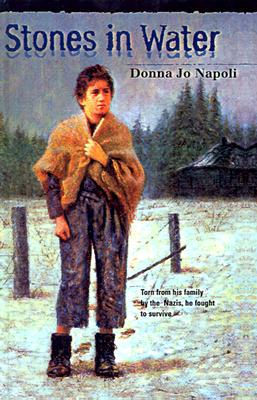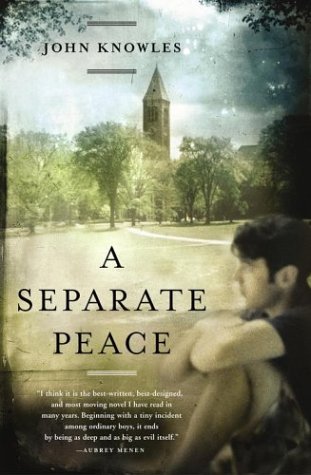
I successfully finished the War through the Generations World War II reading challenge this December, but I haven’t been able to blog properly in the last ten days or so, with the holiday rush. Hopefully this entry still makes it.
For 2009, I’ve read:
1) The Reader by Bernhard Schlink
2) Number the Stars by Lois Lowry
This month, I finished Stones in Water by Donna Jo Napoli, and A Separate Peace by John Knowles.
 Stones in Water reveals yet another new face of World War II, this time in Venice, Italy. Roberto and his friends are young Italian boys who were rounded up and sent to Nazi work camps in Ukraine. Roberto is separated from his brother Sergio, and friend Memo, leaving him with Jewish friend Samuele, whom he is determined to protect at all costs. Samuele becomes Enzo to conceal his Jewish identity, and the pair fight for survival in the chilly work camps.
Stones in Water reveals yet another new face of World War II, this time in Venice, Italy. Roberto and his friends are young Italian boys who were rounded up and sent to Nazi work camps in Ukraine. Roberto is separated from his brother Sergio, and friend Memo, leaving him with Jewish friend Samuele, whom he is determined to protect at all costs. Samuele becomes Enzo to conceal his Jewish identity, and the pair fight for survival in the chilly work camps.
This is a young adult book about the war that tells a little known story about innocent lives who weren’t direct victims of the Holocaust, but were affected all the same — the young boys from the Axis countries who were enslaved by the Nazis to create the concentration camps, subject to inhumane working conditions as well.
While not as graphic as Wiesel’s Night, the book is honest in its narration and starkly illustrates the boys’ plight — backbreaking work in the dead of winter, half-starved and clothed in rags, abused by the officers, and witnesses to the cruelty of the Holocaust.
Donna Jo Napoli is one of my favorite authors and I’ve read a lot of her books, and I like how she blends her Italian heritage into her writing. This book is vastly different from Napoli’s other works of fantasy and history, but it was definitely an eye-opener: prior to reading this book, I had no idea that young boys were indentured in the Nazi work camps, which in turn led to the suffering of hundreds and thousands of Jews.
I found Stones in Water highly sensitive book, and despite the horrors of the war, it remains a beautiful story of friendship, hope, and human spirit, even in the hardest of times.
 Meanwhile, A Separate Peace is another coming of age novel set during World War II, and like Stones in Water, it paints another grim picture of the effect of the war without taking us directly into it.
Meanwhile, A Separate Peace is another coming of age novel set during World War II, and like Stones in Water, it paints another grim picture of the effect of the war without taking us directly into it.
Set in the American prep school at the peak of World War II (1942-1943), Devon, this critically-acclaimed 1959 novel revolves around 16-year old Phineas (Finny) and Gene. Though virtually polar opposites, the bookish Gene and the daredevil Finny are best friends, and co-found a club called “Super Suicide Society of the Summer Session,” with a rite of initiation involving jumping out of a tree into a river that runs through the campus.
The boys’ innate strengths — Finny’s athletic prowess and Gene’s academic achievements — create an undercurrent of rivalry between them, and one fateful day, as the two make the jump from the tree limb, Gene’s knees falter, causing Finny to fall out of a tree and break his leg. Though Finny doesn’t blame Gene, Gene feels guilty because it ends Finny’s athletic career, and it is a guilt that he bears for life.
Meanwhile the war takes its toll on the boys, despite the fact that Devon is hundreds of miles away from the fighting. The story takes on a loss of innocence in a symbolic sort of war, an internal war set aflame by the combat elsewhere in the world, playing on the suspicion that the world is a virtual battlefield and it’s every man for himself, and the boys cope with the war in their own ways.
I found A Separate Peace a very sad story of what could have been an idyllic school experience, with the boys growing up faster than they should, taking on a hardened edge and a cynical view of the world. I like how it shows that you don’t have to be engaged in the heat of battle to feel its effects, that war takes lives in more ways than one.
Both Stones in Water and A Separate Peace are novels that would appeal to boys, even those who normally don’t read fiction. They’re engaging and insightful, with a depth that makes its mark on the reader, especially today when war remains a relevant topic.
These two books give me a total of 8 for the World War II challenge, and these eight books were among my best reads for the year. It was definitely and educational and emotional experience, and one I’ll carry with me in the years to come. Of all the reading challenges I’ve taken, this has had the most profound effect on me as a reader, and I salute those who put up the challenge and the awareness they’ve spread across the blogosphere.
Until the next challenge, everyone!
***
My copies: Stones in Water, hardcover with dust jacket; A Separate Peace, trade paperback
My rating: Stones in Water, 4/5 stars; A Separate Peace, 4/5 stars

Congrats on completing the challenge! We’ve posted your reviews on War Through the Generations here and here.
Yay, thanks Anna!
Bone to pick: I quote “The boys’ innate strengths — Finny’s athletic prowess and Gene’s academic achievements — create an undercurrent of rivalry between them, and one fateful day, as the two make the jump from the tree limb, Gene’s knees falter, causing Finny to fall out of a tree and break his leg.”
Apparently you didn’t read the book more than once. Gene is the only one who is in competition; Finny doesn’t look at life the way Gene does; he’s just happy go lucky, no neuroses. Gene’s actually jealous of Finny, because deep down, he knows Finny is a better person, who has no hostilities or feelings of superiority; he has nothing he has to prove, as Gene thinks he does. Also, Gene jounces the limb, through some impulse. If you read the book through the eyes of someone who’s been through similar feelings, as I have, maybe you’d have a deeper understanding of it. I went through many of the same anxieties regarding my “best friend,” followed his lead, etc. I needed him, much as Gene needed Finny, due to my own lack of a sense of myself.. This is why I love the book so much. I understand it oh too much. (No, I never hurt him the way Gene huts Finny). I used to wish I was in Gene’s position in a school like that.
Hi Tom. Point taken. I have only read the book once, and it’s not a book I can really relate to, perhaps because guys’ friendships have different dynamics than girls’ friendships.
Thank you for sharing! :)
:)